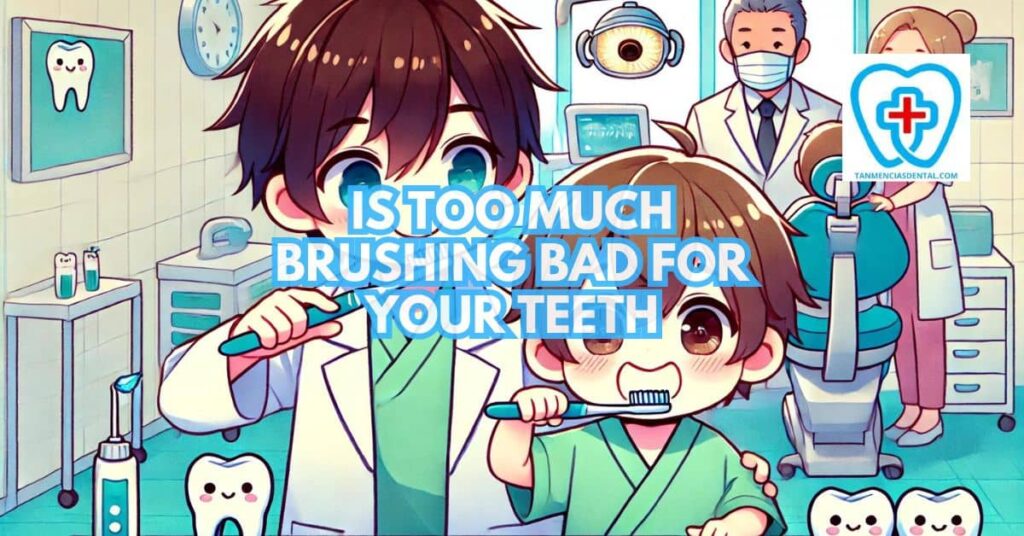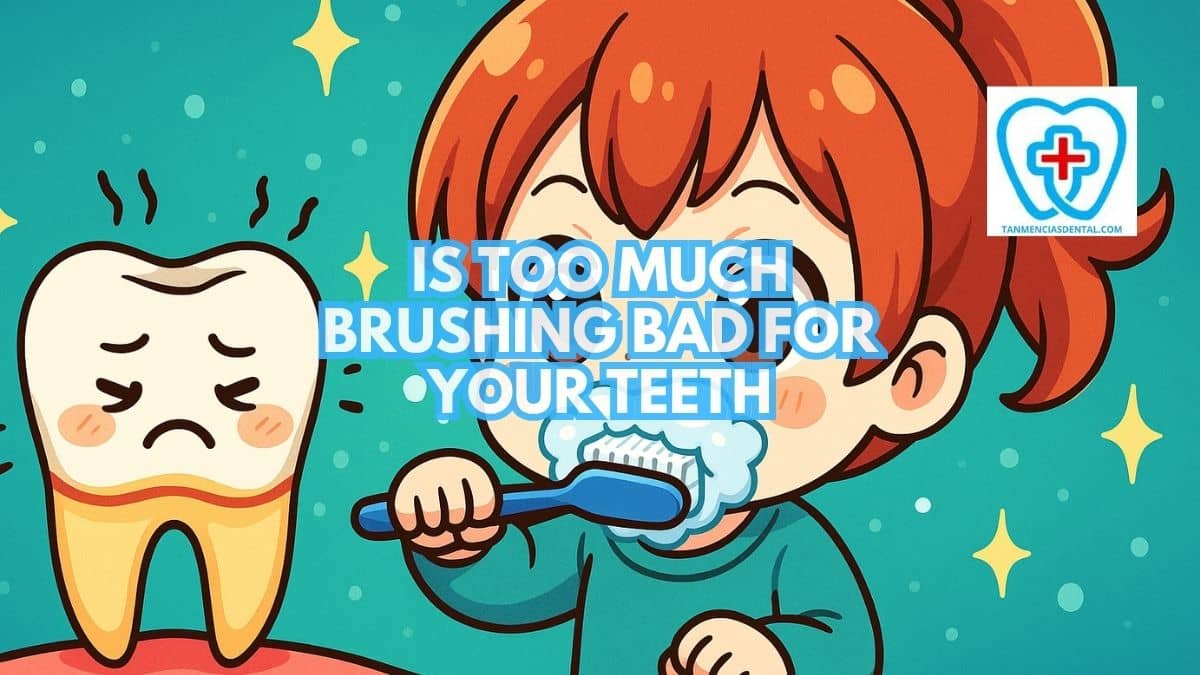Many people wonder, “Is too much brushing bad for your teeth?”
While brushing regularly helps keep your teeth healthy, brushing too often or too hard can actually cause harm.
Excessive brushing can weaken your tooth enamel, cause gums to recede, and lead to sensitive teeth.
Learning proper brushing methods and understanding the right frequency is essential to protect your teeth.
We’ll explain the dangers of brushing too much and how to avoid these risks for stronger teeth and healthier gums.
1. Brushing Power Doesn’t Equal Clean Teeth: Why Technique Matters
Using too much force while brushing doesn’t guarantee cleaner teeth.
Instead, it can damage your enamel and gums.
The best way to brush is to use gentle, circular motions with a soft-bristled toothbrush.
This method effectively removes plaque without causing harm.
Proper technique is more important than the amount of pressure applied, ensuring a thorough yet safe clean.
🦷 Ways to Ease Tooth Pain While Wearing Braces
2. Brushing Away Your Defense: How Overbrushing Erodes Enamel
Enamel is the hard outer layer of your teeth that acts like a shield, protecting them from decay and damage.
While brushing helps keep teeth clean, brushing too hard or too often can wear away this important layer.
Over time, this can lead to problems like tooth sensitivity, cavities, and even changes in the shape of your teeth.
Once enamel is gone, it cannot grow back, and that’s why careful brushing is so important.
Dentists recommend using a soft-bristled toothbrush along with a fluoride toothpaste to gently clean your teeth without harming the enamel.
Fluoride helps strengthen the enamel and makes it more resistant to decay.
In modern dentistry, protecting enamel is a major focus, and avoiding habits like brushing right after eating acidic foods can make a big difference in long-term oral health.
🦷 Methods to Correct High Canine Teeth Without Using Braces
3. Why You Should Wait Before Brushing After Eating Acidic or Sugary Foods
Brushing your teeth right after drinking soda, juice, or eating sugary snacks can harm your tooth enamel.
These foods and drinks make the enamel softer for a short time, making it easier to wear away when brushed.
Dentists suggest waiting about 30 minutes before brushing to let saliva help harden the enamel again.
Waiting protects teeth from extra damage and sensitivity caused by brushing too soon.
It’s better to rinse your mouth with water right after eating acidic or sugary things to remove some harmful substances safely.
🦷 How to Fix Buck Teeth Without Wearing Braces
4. Receding Gums: The Brushing Habit That Can Backfire
Brushing too hard can cause your gums to pull away from your teeth, exposing the roots.
This condition, known as gum recession, can lead to increased sensitivity and a higher risk of root decay.
Receding gums also affect the appearance of your smile, creating gaps between teeth and gums.
To prevent this, use a gentle touch and a toothbrush with soft bristles.
Regular dental checkups can help catch and address early signs of gum recession.
🦷 Typical Duration of Swelling After Wisdom Teeth Removal

5. Brushing Frequency: Twice a Day is the Golden Rule
Brushing your teeth twice a day is generally considered the optimal frequency for maintaining oral health.
Overbrushing can strip away the protective enamel and irritate your gums.
Twice-daily brushing removes plaque buildup effectively without causing damage.
Ensure you brush for at least two minutes each time, covering all surfaces of your teeth.
Maintaining this routine helps keep your teeth clean and your gums healthy.
🦷 What You Need to Know About Caring for Wisdom Teeth After Removal
6. Frayed Friends No More: Why Replacing Your Toothbrush is Important
A worn-out toothbrush is less effective at cleaning your teeth and can even cause harm.
In time, bristles become frayed and lose their ability to remove plaque efficiently.
It’s recommended to replace your toothbrush every three to four months, or sooner if the bristles are visibly worn.
Using a fresh toothbrush ensures you’re brushing effectively and gently.
An old toothbrush can also harbor bacteria, which is another reason to keep it regularly updated.
🦷 How to Clean Your Teeth When You Don’t Have a Toothbrush
7. Brushing Isn’t Enough: Partnering Brushing with Flossing for Complete Cleanliness
Brushing alone cannot remove all the plaque and food particles between your teeth.
Flossing complements brushing by reaching those tight spaces where a toothbrush can’t go.
Regular flossing helps prevent cavities and gum disease by removing hidden debris and plaque.
Make flossing a daily habit to enhance your oral hygiene routine.
Using both brushing and flossing ensures a comprehensive clean for your teeth and gums.
🦷 Tips to Reduce Swelling After Wisdom Teeth Removal Quickly and Safely
8. Bleeding Gums and Sensitive Teeth: Warning Signs of Overzealous Brushing
If your gums bleed or your teeth become sensitive, it might be a sign of overbrushing.
These symptoms indicate that your gums and enamel are being damaged by too much force or frequency.
Pay attention to these warning signs and adjust your brushing technique accordingly.
Use a soft-bristled toothbrush and gentle strokes to avoid further harm.
If symptoms persist, consult your dentist for advice on protecting your oral health.
🦷 The Truth About Brushing Your Teeth With Orange Juice
9. Electric Toothbrush Power: A Great Tool, But Use It Gently
Electric toothbrushes can provide a more effective clean than manual brushes when used correctly.
However, it’s essential to let the toothbrush do the work without applying too much pressure.
Excessive force can still cause enamel erosion and gum recession, even with an electric brush.
Most electric toothbrushes have built-in timers and pressure sensors to guide you.
Follow the manufacturer’s instructions and use gentle movements for the best results.
🦷 Home Methods to Straighten Teeth Without Braces
10. Listen to Your Mouth: Discomfort Could Signal Brushing Issues
Pay attention to any discomfort, pain, or sensitivity in your mouth while brushing.
These signs can indicate you’re brushing too hard or too frequently.
Addressing these issues early can prevent long-term damage to your teeth and gums.
If discomfort persists, it may be wise to consult with a dental professional.
Adjust your brushing technique and pressure to maintain a pain-free and effective oral hygiene routine.
🦷 Why Patients Should Explore Alternatives to Dental Implants After Losing a Tooth
11. Don’t Brush Away Professional Help: Regular Dental Care is Key
Regular dental checkups are vital for maintaining optimal oral health.
Professional cleanings and examinations can catch issues caused by overbrushing early on.
Your dentist can provide personalized advice on brushing techniques and frequency.
Combining proper at-home care with regular dental visits ensures comprehensive protection for your teeth and gums.
Don’t underestimate the importance of professional dental care in your overall oral health regimen.
🦷 Holistic Dental Care Services in Marikina
👨⚕️ Conclusion
Brushing your teeth is crucial, but too much can lead to problems like enamel erosion and gum recession.
Striking a balance with proper technique and frequency is key to maintaining healthy teeth and gums.
Use gentle strokes, a soft-bristled toothbrush, and complement brushing with flossing.
Regular dental visits are also essential to address any potential issues early.
By following these guidelines, you can keep your smile healthy and strong.
😊 Self-Promotion
Visit Tan-Mencias Dental Clinic in Parang, Marikina City, for top-notch dental care delivered with a smile.
Our friendly and professional team is ready to address all your oral health needs.
You can reach us easily by calling 9171451074, sending a message through our Facebook page, or completing the contact form on our website.
We’re here to answer any questions or concerns you may have.
Let us help you achieve a healthy, beautiful smile at Tan-Mencias Dental Clinic!

